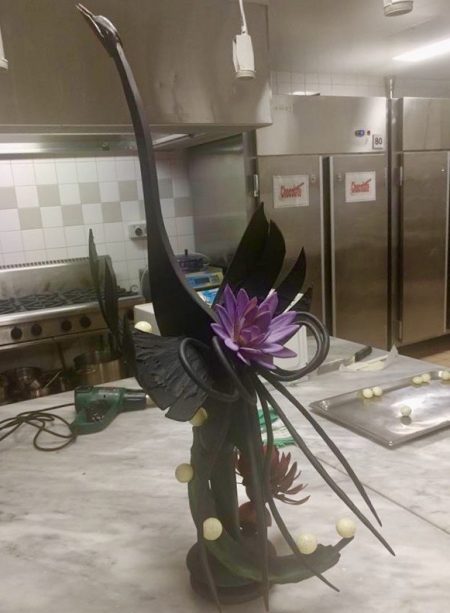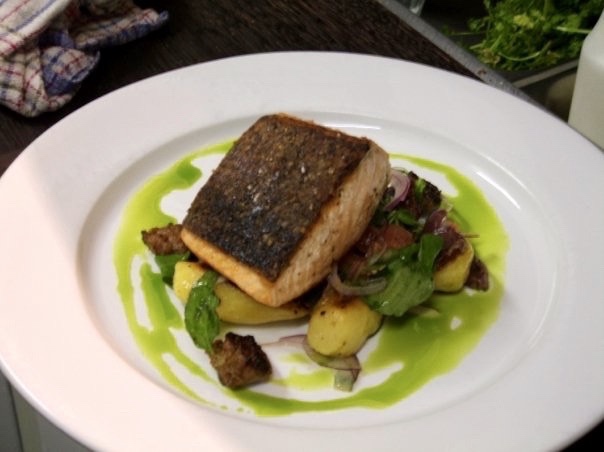Jeff Lewis has had a huge chef’s life, been smacked and abused, but not put in a tumble dryer as one young apprentice was recently in France.
Now, Jeff devotes his life and experience to teaching the young wannabe’s and making sure they’ve got the skills to back the paper qualification. He’s a chef trainer, and that can be a real challenge today …
Jeff tells his story, and his training? Some of the best there is.
“I started off in Tamworth in 1994, fresh from school, and far from cooking, my first job was working in a spare parts franchise. But I wanted to travel, and like so many others in the industry, I got jobs in hospitality for extra cash. After 6 months in Matilda’s, (a big Australian themed franchise), working under Gunter Karsch, executive chef, in a small team – him, me a couple of commis and a sous – I got yelled at by a commis. Well, being young and hot-headed I arced up, said I could do a better job, and got slapped on the back of head to pull my head in.
I backed off then, but after I went home, I got a phone call from the restaurant, ‘don’t bother coming in’. “Okay,” I thought, “Fair enough.” I was young and not too worried. But on Monday morning at the spare parts business, Gunter was waiting for me with apprenticeship papers! You could have knocked me down with a spatula!

Chocolate showpiece
Gunter pushed me to sign up, and I was interested, so suddenly, there I was, two weeks later and 23 years ago wearing whites in his kitchen, saying, “Yes, Chef!” He was a fair man, but his discipline was traditional heavy-handed bullying really, and he would push buttons. Half the stuff that was done to me would be a jailable offence now. I look back at that time, and am so glad that there’s no need for that now. I recently read a story of an apprentice in France being forced to climb into a tumble dryer – incredible abuse! It shows how bad it can be if egos aren’t checked, and my mission now is to work on helping to develop the right kind of culture in kitchens.
It’s very easy when you’re in a white jacket, locked up in a stainless steel and ceramic white box to forget about what’s going on over the other side of the pass.
After 12 months at Matilda’sI went to the Gold Coast, then quickly realised under the gloss of sun and sand, it had a dark side, so I headed to Melbourne and finished my apprenticeship. They were busy years, and I boomeranged to Brisbane and then back to Melbourne. I did everything: cafés, fine dining, events.
I loved working at cafés under Europeans, I guess that went back to my Gunter days, and I moved a lot. Eventually I finished at Café Nuvolariin Albert Park, named after the Italian race car hero because it was near the Grand Prix circuit.
The head chef was Danilo Siracusa and he ran a real scratch kitchen, baking bread every day, pasta, everything – there was no mis en place from any previous day. Apart from stocks and terrines, which need time, everything else was fresh daily. It was a fantastic place to work.
Even when I went to TAFE we were taught properly, and given whole beasts to break down, learning butchery, seafood preparation and timing, including how to identify and learn how to cook it all. The skill set and techniques were fantastic.
You know? I think that convenience products are one of our biggest problems in the industry – how do you justify a rice bran mayonnaise that’s been dyed yellow and called hollandaise? The franchises these days have everything bought in: pre-cooked, pre-ordered, you can even buy shelf stable lamb shanks, vacuum packed boiled eggs! And I think that’s damaged both the industry and the trade. How else do you explain qualified chefs who can’t break down an animal, or poach an egg?

Crispy skinned salmon, chorizo and watercress oil
I’ve been a trainer now for 9 years, and I reached tipping point with the industry, working for a mate who had a catering business as well. I couldn’t believe the amount of triple handling in mise en place, and kids telling me how to cook when they had no idea, so I decided I needed to either get out or do something to make a difference.
So I did something and became a trainer, so I could at least influence the new apprentices. My first job was teaching at Carrick Education with internationals. That was an eye-opener, and there were a lot of problems caused by ‘shake and bake’ students with diplomas who’d bought those pieces of paper, not worked for them.
I was teaching patisserie and cookery and I got bounced because I wouldn’t compromise and sign off on students who couldn’t do anythingand could be at risk in a kitchen. But, like most things in life, it was meant to be, and was a good transition, because I realised as well that I was still communicating like a chef, but then I learnt to step back into a trainer’s shoes – looking at my delivery and what we’re teaching.
I bring it all back to mise en place –the French for everything in its place and a great metaphor for your way of life.
Lucky me as well, because the first class I had, Certificate 3 in Patisserie – had a girl who was already qualified and was there to learn patisserie, who helped me hugely in controlling the class, almost like having a surrogate Sous – so off I went.
After Carrick, I started with Work Skills, teaching Certificate 3 in Cookery, Certificate 3 in Hospitality and Diploma of Hospitality delivering onsite training. I was with them for 5 years, but things changed as funding and management moved and changed, and standards dropped.
You know what? I’d like to see a big shake up in the industry to get rid of the dodgy operators. Adjusting for me from the classroom based training to onsite training was a big jump forward for me. My business is all on site, out in the workplace, so I have to build rapport with chefs, work out how the apprentice best learns. It’s big, and I focus first on LLN, the language, literacy and numeracy check that is now standard for enrolment. Such a great initiative, and I really hone in on the speaking and listening components to best work the teaching method to match the student’s abilities. I teach all of the units hands on. With the poultry unit for instance, which is usually delivered in second year, I ask them to organise the product/poultry in dishes to show apprentices how to make money = this is what you do to make money here so this business survives. That’s key, isn’t it? That’s why businesses are there – to survive, and if the chefs don’t understand that, well, they’re in trouble.
I make all the training hands on as best I can, building rapport with both student and employer so everyone’s on the same page. I’ve been doing that for going on 8 years as an employee with a few different RTO’s. In Queensland the funding for apprentices and trainees falls under User Choice, but each State has its own name/ approach. I currently sub-contract as a trainer and assessor for William Angliss so nothing’s changed for me and the way I work, other than I no longer have KPI’s pushing me to sign off students, so now I get to actually train the students how they need to learn, and not be pressured to tick and flick, they are signed off when they are able to demonstrate competency to me and their Chef. I’m delivering everything from Cert 2 up to Diploma Level – which is where the management skills sit.
My goal? Well, that’s easy! It’s to get a qualified tradesman who has the skill set and knowledge who can step in and do– with resilience, knowledge, and all the basics. I bring it all back to mise en place – the French for everything in its place – and a great metaphor for your way of life. If you have your shit together, you’re set. Cope with the unexpected. Suddenly you have an extra 20 bookings – can do!
And I work on their developing good habits. Having the uniform clean, knives sharpened, packed in their bag ready to go night before. Having your prep list on your section before you leave any shift – so, if you get hit by a bus, they know what’s happening on your section.
A big part of the frustration of any creative is stepping up to other parameters, with budgets, staff and employers
This goes back to the training from Gunter on – I always hunted down the best chefs I could work for to gain the best experience I could. They taught me that good habits are vital in every kitchen, then they can cope with anything, any eventuality without thinking. You shouldn’t need someone watching you.
And for young people, I always get them to look at the bigger picture. Take breaking down chickens. What’s the benefit of buying whole chickens? You use trim for, stocks, consommés, there should be no wastage, no usable product thrown out, any waste that can be composted should be – environmental sustainability is now a core unit. I ask them: what are you wasting from what comes in? Teach them how waste affects their job security and the practical applications of what they’re doing. It’s very easy when you’re in a white jacket, locked up in a stainless steel and ceramic white box to forget about what’s going over the pass.

White chocolate and raspberry cheesecake
When you’re in that box, it’s all about creating – but they need to step back and evaluate with a view to the customer, likes, returns, and put their reflection on the business.
A big part of the frustration of any creative is stepping up to other parameters, with budgets, staff and employers. I only really find the ones who have skills for business are big runners of business, hotels, but at the grassroots level – conflict resolution skills and management, team management, the skills are minimal, which creates endless problems.
With any complaints, I try to get them to look at the logistics of how a kitchen runs, and what the business is. It’s a two way street dealing with businesses – it’s how I get to know the state of the industry, helping as much as I can the chefs, the managers, the staffing issues. Staff need to see the reality – the whole business, from all the issues, including front of house who are the meat in the sandwich. Kitchen people are mostly there because it’s a passion – FOH are mostly transients who don’t have the same personal, passionate investment, there are not many FOH lifers as there use to be.
To address that, now FOH apprenticeships are being reintroduced. Certificate 3 in Front of House is being re-introduced, as an option, and I think that’s a fantastic start. Every time I go down Lygon Street I look around and there, every day, you have your old school ‘lifers’ – and they’re so damned professional with their level of service and charm. Somehow, they manage without you even being aware, to have you seated, with water and a menu before you’ve decided on where you’re going to eat! They’re masters!
You know, there’ll always be issues, particularly when there’s ego in the place.
The sector-wide lack of training for FOH – creates stressed staff. Diplomacy – one of the big issues I try to include dictates the culture of any business. Why does there alwayshave to be a weak link? Planning a menu –considering the equipment, customers, produce, industry trends – any menu needs to planned for the weakest link. And I don’t mean that in a judgemental way, but don’t treat them (the weakest link) like a leper. Work out how you can work around their availability – you need a flexible workplace, to give people a chance to grow with the business. Time and effort needs to be invested in the staff, to train, to give them a reason to succeed, to up skill, gain qualifications. In every case, places that have been churning and burning suddenly run out of staff.
Management styles need to be addressed. I try to get across to the business owner that they need to put reward and recognition in place. And when you do that, you develop a valuable asset – an asset for the business, an advocate. For me, it’s all about increasing the quality levels of a place, which is increasing the viability.
You know, there’ll always be issues, particularly when there’s ego in the place. I work on problem solving by taking the focus off the actual reaction – identify the cause and see why – relating stuff back to who they are and where they’re at? Is there something you could have avoided? What lesson have you learnt from this? Key in all this is getting them self aware, so they act rather than react. Makes for a smarter and better functioning person in any business.
A big part of what I do is mentoring – what is the motivation? Sometimes they never wanted to be a chef? So I do ask the hard questions: why are you here? Is this what you want? I would hate for anyone to go through years of training only to find out they’re on the wrong track.
As a chef trainer, my advice for young kids starting out? Don’t make a big deal out of everything – just deal with it. Fix the problem. See the solution. Push your mise en place – push your ability and knowledge – keep learning. Never stop. Look for that attention to detail. And as Marco said, “You can’t reinvent the wheel but you can always paint it a different colour.”
Chrissie ☺




Thank you Graham. Yes, and so on point with what he’s teaching. I wanted to stand and applaud!
Great read and I can say he is the same person in real life – A true professional, passionate about the industry.